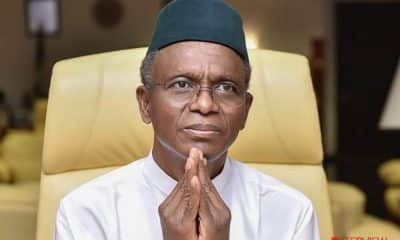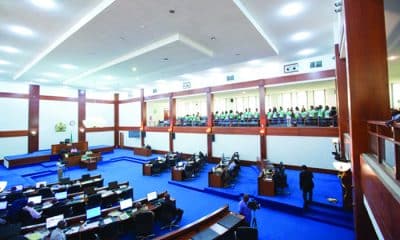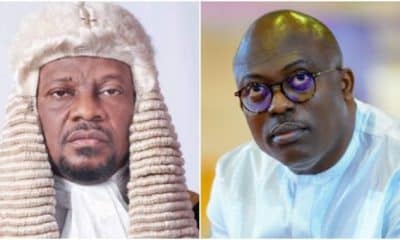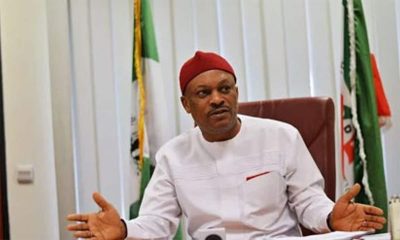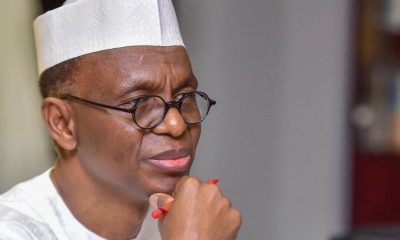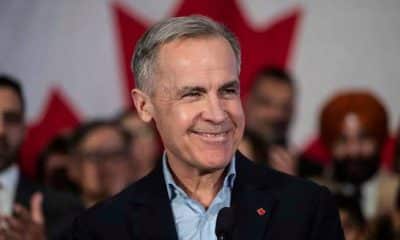Nigeria News
ASUU Makes Announcement, Gives Update On When 5-Month-Old Strike Will End
![[BREAKING] ASUU: FG Begins Payment Of Lecturers’ Salary Arrears](https://www.naijanews.com/wp-content/uploads/2022/05/Screenshot_20220509-084924.png)
The Academic Staff Union of Universities (ASUU) on Tuesday announced that there is no going back on the strike action embarked upon by members of the union until the federal government accedes to their demand.
The ASUU National President, Professor Emmanuel Osodeke, stated this on Tuesday while providing an update to newsmen about the strike action that commenced on February 14.
According to him, the Minister of Labour and Employment, Chris Ngige is a major hindrance in the way of efforts to end the strike and ensure the nation’s public universities are re-opened.
Osodeke stressed that issues such as the adoption of the University Transparency and Accountability Solution (UTAS) instead of the Integrated Personnel Payroll Information System (IPPIS), the poor funding of universities, non-payment of salaries and allowances of some of their colleagues, as well as the inability of the government to pay earned academic allowance to lecturers, among other issues must be addressed before resumption can take place.
ASUU further decried the non-implementation of the 2009 FGN/ASUU agreement, noting that the issues on ground must be addressed in order to break the deadlock.
The union’s president said for now, the struggle continues adding that while ASUU remains bothered about the lingering strike and its impact, the strike is in the overall interest of Nigeria.
Read the full text of the briefing by the ASUU president below:
“Comrades and compatriots of the Press,
“It has become imperative for us in the Academic Staff Union of Universities (ASUU) to update Nigerians and lovers of education everywhere in the world on the status of our ongoing nationwide strike action which began on 14th February 2022. The need for doing so could be traced to two sources. First, as a union of intellectuals that deals with facts and verifiable claims, there is need to put the records straight on our engagements with the government.
“This need becomes very compelling against the backdrop of the statements recently pushed out from the government quarters. Specifically, there have been insinuations by the Minister of Labour and Employment, Dr. Chris Ngige, that there was no agreement between ASUU and the government; that ASUU sat down to fix its own members’ salaries; and that our Union asked representatives of ministries, departments and agencies (MDAs) to recuse themselves from the negotiations.
“Also, it appears that Dr. Ngige has deliberately misrepresented the International Labour Organisation’s (ILO) convention on the collective bargaining agreement and the roles of a conciliator to serve his propagandist interest in this matter.”
ON AGREEMENT OR NO AGREEMENT
“Following the resumption of the strike action by our Union at the University of Lagos, on the 14th February 2022, we participated at several meetings at the instance of the Ministry of Labour and Employment chaired by Dr. Chris Ngige as “Conciliator”. To our utter dismay, nothing concrete came out of the endless deliberations as the Conciliator kept approbating and reprobating. For instance, he would declare that he fully supported our demand that the renegotiation of the 2009 FGN/ASUU be speedily concluded within six weeks while at the same time creating an unrealistic pathway to arriving at a Collective Bargaining Agreement (CBA).
“Similarly, Dr. Ngige kept going back and forth on concluding the integrity test for the University Transparency and Accountability Solution (UTAS) for replacing the discredited Integrated Payroll and Personnel Information (IPPIS) contrary to the letters and spirit of the Memorandum of Action (MoA) of December 2021. Matters got to a head when our Union leaders were forced to express their frustration at one of the so-called conciliatory meetings.
“When we expressed our frustration at the manner the engagement processes were going, Dr Chirs Ngige. went on to lampoon the Ministry of Education; saying he was not our employer. At a point, he directed our Union to go and picket the office of the Minister of Education, who is our employer! Subsequently, he tactfully recused himself.
“The Nigeria Labour Congress (NLC), having observed the snail speed and lack of result, threatened and called on the Federal government to set up a high-powered committee to look into the matter. The NLC’s intervention resulted in the “Tripartite-plus” meeting chaired by the Chief of Staff to the President and Commander in Chief, Prof Ibrahim Gambari on 12th May 2022. Contrary to his claim, the meeting that held at the State House Banquet Hall was not convened by the Minister of Labour and Employment.
“In fact, Dr. Ngige did everything within his capacity to frustrate the suggestion by the Sultan of Sokoto, His Eminence Alhaji Sa’ad Abubakar III, and supported by the Co-chair of the Nigerian Inter-Religious Council (NIREC) and President of Christian Association of Nigeria, Revd. Dr. Samson Ayokunle, that the embargo placed on university workers’ salaries be lifted to pave way for amicable resolution of the crisis.
“For the avoidance of doubt, at no point did ASUU say the President and Commander-in-Chief was going to sign any agreement between us and the government. What we said was that our Draft Agreement was receiving attention by the President. Our claim about a Draft Agreement was predicated on the fact that it was the second document to be produced by a joint Renegotiating Committee of the 2009 FGN/ASUU Agreement comprising representatives of MDAs and the ASUU team.
“The first draft was coordinated by Emeritus Prof. Munzali Jibril, who took over the Chairmanship of the joint renegotiating committee from Dr. Wale Babalakin. That draft was submitted in May 2021 but was rejected by the government a year later! The second and current report was arrived at after the government’s team was reconstituted in April 2022 under the Chairmanship of Emeritus Professor Nimi Briggs.
“The Briggs-led Renegotiating Committee began their work with extensive consultations with heads of relevant units in the MDAs and shared a written submission of their findings with our union. We were reassured then, that the new committee had a clear mandate to review the Munzali-led committee’s report through a collective bargaining process. It was that process that produced a Draft Renegotiated Agreement on 16th June 2022.
“The government team was expected to present the draft document to its principal as done a year earlier. ASUU did not expect the President of the Federal Republic to sign the document because neither the 2009 Agreement under review nor any of the previous ones were signed directly by the Head of the Government.
“What we said and we are saying is that the government team was expected to obtain the needed clearance to sign the Draft Agreement which came out of a collective bargaining process that began way back in 2017! If Dr. Ngige means well as a “conciliator”, why will he be putting roadblocks on the path to completing a process that has dragged on for more than five years?
LABOUR MINISTER AND COLLECTIVE BARGAINING
“The Ministry of Labour and Employment, as the chief labour ministry of the country, is principally expected to apprehend disputes between employers and employees with a view to settling such disputes. The Ministry shall normally await reports of disputes by either side to the disputes for settlement. When the Minister apprehends a dispute, he/she must communicate to the parties or their representatives, his or her own proposal for the resolution of the dispute.
“However, ASUU has always had serious reservations about the claim of “conciliation” by someone who has taken sides in the dispute, or by an unabashed protagonist in the crisis such as the current Minister of Labour and Employment. It is antithetical to the International Labour Organisation (ILO) Conventions (98, 151 & 154) on collective bargaining and tripartism.
“It is against the principle of natural justice and the doctrine of equality for Dr. Ngige who carries himself as if he has personal scores to settle with ASUU and shoots down the Union everywhere it matters to assume the role of conciliator.
“The Trade Dispute Act, the principal legislation for labour relations, does not empower the Minister to assume the office of conciliator. This is to guarantee the principle of ‘’good faith’’ in negotiations, which implies making every effort to reach an agreement, conducting genuine and constructive negotiations and applying them in good faith. A collective agreement is between an employer or group of employers or representative agent, on the one hand, and one or more workers’ organisation on the other.
“To the extent that the Federal Government, through the Ministry of Education, empanelled the Emeritus Prof. Nimi Briggs committee to negotiate on its behalf with university-based Unions in Nigeria, the purpose of which is to create and agreement between the parties, that committee is the representative agent of government. Any resolution(s), reached by the parties, such as draft agreements, are then to be ratified by the authorised signatories on behalf of the parties to achieve a binding collective bargaining agreement.
“ASUU, therefore, makes bold to say that the Minister of Labour and Employment has taken upon himself the role of unabashed protagonist in our ongoing dispute with the government of Nigeria for some inexplicable reasons. Dr. Ngige earlier told whoever cared to listen that he was not the employer of university academics and advised the union to march to the Ministry of Education. Nigerians may wish to know why he has suddenly turned around to constitute himself into an impediment to an amicable resolution of the ongoing crisis.”
FUNDING OF PUBLIC UNIVERSITIES
“Comrades and compatriots, it has become the pastime of government officials to talk tough about billions and trillions of naira whenever the thorny issues of education and health sectors’ funding come up for mention. However, it is common knowledge that various sums of money in the same region which could have been deployed for human capacity development and public good usually develop into the thin air at the end of the day!
“We are therefore not surprised the leadership of the Ministry of Labour and Employment could condescend to the point of denigrating the import of massive injection of fund into the University Education sub-sector as they tried to miserably dismiss the vexed issue of funding Nigerian public universities and uplifting the country’s intellectual capital. While government and its agents, would like to look at the issue in the ‘’here and now’’ and funding as a one-off matter, we prefer to look at it longitudinally.
“ASUU believes that the idea of availability of funds is a dynamic process. For instance, government can mobilize funds from different sources including non-budgetary outlets like stamp-duty, GSM and alcoholic taxes. These were parts of our recommendations at the National Workshop organised by the Federal government on sustainable funding of education in Nigeria, held between 27th and 28th November, 2018, at the Banquet Hall of the State House in Abuja.
“At the workshop, MDAs were also challenged to remit, for the purpose of raising budgetary profile, excesses that accrue and not accounted for. We insist that, until and unless these sources of ‘loose funds’ are pooled and appropriated in support of education funding, Nigerian Universities will not be positioned to compete globally as well as develop and attract local and foreign grants.
“The Minister of Education admitted at the Inter-Ministerial Retreat in November 2017 that Nigeria was lagging behind less endowed African countries in terms of investment in education. In his words “None of the E9 or D8 countries allocates less than 20% of its annual budget to education”. In the last seven years of the outgoing government the country’s annual budgetary allocation have not gone beyond eight percent! Is this progress?
“We are appalled by the recent calls by top government functionaries at both federal and state levels to establish more universities at a time agencies run by same Chief Executives are tightly squeezed for funding. The little that is available is thinly spread across many tertiary institutions with minimal impact.
“Many heads of tertiary institutions in the country would not hesitate to confess that their universities polytechnics and colleges would have gone under but for the existence of the Tertiary Education Trust Fund (TETFund). We restate our opposition to the proliferation of universities and other tertiary institutions merely for political gains or electoral value. Nigerians should read through the intentions of hypocritic political jobbers when dangling the carrots of siting institutions they have no intention of developing to compete with others in Africa and beyond.”
CONCLUDING REMARKS
“ASUU appreciates some recent efforts by critical stakeholders across the broad spectrum of the Nigerian society to resolve the logjam and restore normalcy on our university campuses. The initiatives of the NLC and its affiliate unions are quite commendable. But it is not over until it is over! We also acknowledge the interest of political actors in various groups and platforms who have promised to wade in.
“ASUU’s doors of engagements are wide open to all, but we remain unsympathetic to political party sentiments and blackmail irrespective of where such are coming. For a greater and better Nigeria, education is key. So, we remain focused on our goal of making the Nigerian University system internationally competitive and our getting our products to stand shoulder-to-shoulder with their peers in any part of the world.
“We appreciate the teeming Nigerians for identifying with our vision in this respect. We specifically acknowledge the support and sacrifices of our students (including our members who are running their postgraduate programmes) as well as their parents; they are our critical partners in this transformation project. We in ASUU shall do our utmost best not to let you down.
“Compatriots of the Press, ASUU appreciates your concerns and sympathetic support. We are as bothered as you are because we share a common interest in the Nigeria project.
“However, ASUU shall continue to be guided by the sacred canons of integrity, objectivity, and responsibility to which both academics and media practitioners subscribe. It is our fervent hope and desire that the current groundswell of interests would culminate in a convergence of solutions to this avoidable crisis in the overall interest of Nigeria.
“Together, we shall win.
“The struggle continues!
“Thank you.”
Emmanuel Osodeke
President
19th July, 2022

